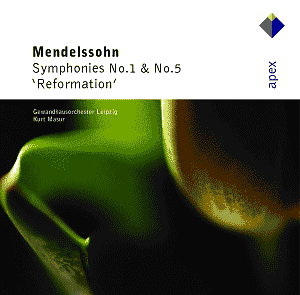This
is the second of the old Warner Ultima double packs now released
as single discs at super-budget. Having given the thumbs up to
the first, the Hymn of Praise Symphony-Cantata,
this strikes me as every bit as successful. It is an extremely
popular coupling, but Masurís crisp, sprightly, no-nonsense approach
makes for very satisfying listening, and only if you are wanting
more indulgently Romantic readings are you likely to be disappointed.
The
First Symphony bristles with life, and the ghosts of the
great classical masters loom large over events, as might be expected
from the 15-year-old composer. That is probably why I like Masurís
way with the music, attacking accents with punch but not aggression,
making sure allegros are buoyant and colourful without forcing
extremes of tempo. The playing of the Gewandhaus Orchestra must
really be commended here, with lithe, supple strings and deliciously
pointed wind playing. The more spacious approach of, say, Ashkenazy
on Decca may please some in the lovely, song-like andante, but
Masurís flowing speed never gets in the way of the lyrical line,
and he is always sensitive to details.
Again
in the Reformation, some may want more affectionate phrasing
or greater space and freedom. But there is no lack of mystery
in the slow introduction to the first movement, and Masurís handling
of the Dresden Amen passages that permeate it is delicate and
wistful rather than pious or awe-struck. Granted, the second movement
nearly becomes a hectic scherzo, but one cannot help thinking
the point and wit in the playing as being thoroughly idiomatic.
The initial statement of the Ein feste Burg chorale in
the finale, on unaccompanied flute, is wonderfully ethereal and
gossamer light, and later climaxes are superbly judged.
Digital
recording quality is excellent, with space and detail in perfect
measure. The main super-budget competition seems to be from Masurís
earlier cycle, now on Brilliant Classics, but these later recordings
have a great deal to commend them and can be very confidently
recommended.
Tony
Haywood
